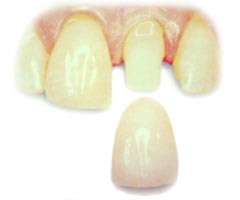I have two new porcelain crowns on my center front teeth. One of the crowns is slightly darker than the other one but neither crown matches my natural teeth. I feel like crying because of the amount of money that I spent to get a pretty smile. This is something that is noticeable. I asked my sister to look at my teeth, and without my saying anything she noticed the difference between the two crowns, and that they do not match my teeth. Can this be fixed? Can the crowns be stained or bleached? I don’t have money for new crowns.
Frankie
Dear Frankie,

Staining or bleaching will not correct the color difference between the two crowns. And it won’t help your new porcelain crowns match the shade of your natural teeth.
Whiten Teeth before Receiving Porcelain Crowns
Ideally, if you want a bright smile, your teeth should be whitened before you receive porcelain crowns. The crowns can then be made to perfectly match the shade of your natural teeth.
Achieving the Correct Color for Your Crowns
A dental crown is cemented to or bonded on your natural teeth. Removing crowns and replacing them with new crowns in the correct shade requires a skilled and artistic cosmetic dentist. Experienced cosmetic dentists take several steps to ensure your crowns match your natural teeth:
Take photos of your teeth
Send photos and instructions to a dental lab to craft crowns with precise color, shape, and size
Temporarily seat the crowns to ensure they fit well and match your natural teeth
Send the crowns back to the lab if they are not an exact match
The process can take several office visits. But when you receive porcelain crowns from a cosmetic dentist, he or she will communicate with you throughout the process to ensure that you love the look and color of your restorations.

You can schedule consultations with two different cosmetic dentists to discuss your options and how your new porcelain crowns can be made affordable for you.
This blog post is sponsored by Lafayette Dentists Drs. Thimmesch and Foreman.

